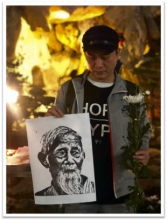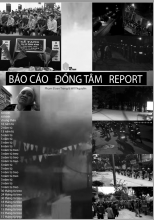New report on Vietnam’s deadly Dong Tam incident

Earlier this year, just as we were putting together a ground-breaking report on Vietnam’s little noticed practice of forced televised confessions, Coerced on Camera, four new confessions were broadcast on Vietnamese TV. The three men and one woman were caught up in a long-running land dispute not far from the capital Hanoi, that ended with deadly clashes between police and villagers, now known as the Dong Tam Incident.
A new report written by Vietnamese journalist Pham Doan Trang and American-Vietnamese activist Will Nguyen is highlighting just how big a story this is for Vietnam.
On January 9, 2020, between 1 and 3 AM, thousands of police from special task, riot, criminal, and investigative units cordon off Dong Tam in coordination with local ground forces and attacked villagers; the early morning attack was the culmination of a long-running dispute over Senh Field, a 59-hectare parcel of land about five kilometers away.
The villagers were never officially notified of the attack but had heard over public loudspeakers the week prior that the land was “for national defense purposes”, a position the government had reiterated for years regarding the disputed piece of land.
Realizing the sudden message was an implicit warning that the government was about to crack down, Dong Tam villagers declared in a video recorded several hours before the attack that they would “fight to the death” to hold onto the land.
- From the new report on the Dong Tam incident
In early September, 29 Dong Tam villagers, including those four, were brought to what amounted to a show trial and sentenced for the crimes of murder or obstruction of officials. In total, two death sentences, one life sentence and more than 80 years in prison were handed down.
19 of the 29 said they had been tortured to extract confessions.
- From the new report on the Dong Tam incident
New report highlights abuse in Dong Tam trial

The report concludes the Dong Tam Incident was the largest peacetime land dispute in modern history in terms of the numbers of troops and deaths and the way authorities handled it was brutal, an abuse of power and illegal under Vietnamese law.
The investigation was riddled with inconsistencies and the treatment of detainees was unlawful. These include:
- conflicting police reports about what happened on the night of the raid, in particular as regards the death of a village leader and three police officers;
- the use of torture to extract confessions;
- the serious harassment of the defense lawyers;
- the blocking of independent media and families of the defendants from attending the trial;
- the use of a police “documentary” film as evidence at trial; and
- the refusal to allow some defense witnesses.
The very detailed 65-page report also contains lawyer’s arguments, court testimonies and images from the night of the Dong Tam incident.
What was the Dong Tam incident?
In the early hours of the morning of 9 January 2020, around 3,000 police descended on the village of Dong Tam to stop the residents from opposing the seizure of a parcel of nearby land of about 59 hectares that they argued belonged to them and that they should be fairly compensated for.
“I was beaten [with a rubber truncheon] for ten days straight”.
- Le Dinh Cong, found guilty of murder, sentenced to death.
People described how the Internet and phone lines were cut shortly before police stormed the village with “tear gas and grenades filled with plastic ball bearings.”
“Witnesses describe 'thousands of police officers rushing into the village' using flash grenades, firing tear gas, shooting rubber bullets, blocking off all pathways and alleys, and beating villagers indiscriminately, including women and old people.”
Officers shot dead village leader Le Dinh Kinh, aged 84, and arrested many members of his family. Official media also said that three police officers had died. A few days later, four villagers, including Kinh’s son, grandson, adopted daughter and another male relative, appeared on state broadcaster VTV1 to confess to taking part in the violence. Their faces were bruised and cut.
Over the next few months, as police arrested more villagers, there were reports of others being tortured into confessing.
On Monday, 14 September, the court sentenced Le Dinh Kinh’s sons -- Le Dinh Cong (who had been forced to confess on TV) and Le Dinh Chuc to death and his grandson, Le Dinh Doanh (who had also been forced to confess on camera) to life in prison.
"When I was interrogated at Mien Mon police station, my legs were severely beaten as a means of coercion.”
- Bui Thi Noi, found guilty of police obstruction, sentenced to six years.
Key points raised in the report
- Although the origin of this incident was a land dispute, the police raid was not a repossession of that land. The raid was in the middle of the night and on the village itself. The disputed land was several km away.
- There were inconsistencies into how the three officers were said to have died.
- The government mobilized a huge public opinion campaign to get the public to believe their version of the raid including the mainstream media and online opinion leaders including Facebook users.
- Violent land evictions have become more common in Vietnam but Dong Tam was unique because of the huge PR effort mentioned above.
- The raid was illegal under Vietnam’s Land Law because it was conducted at night and the proper procedures, such as informing the villagers, had not been followed.